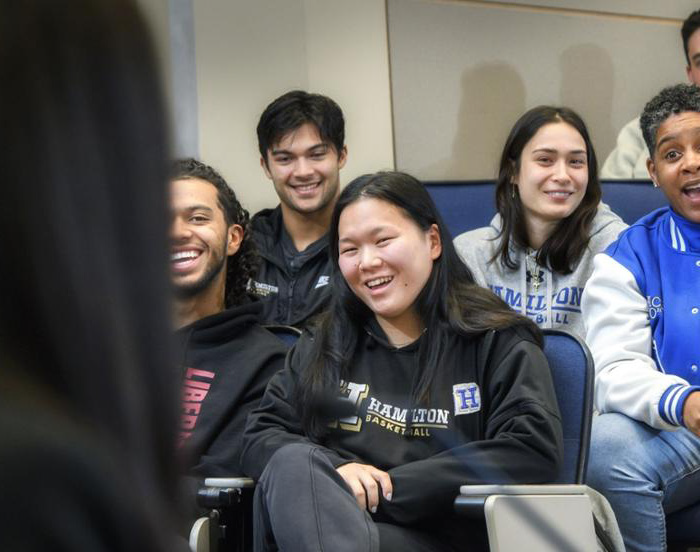
All tennis players are a bit messed up psychologically. Their existence is based on repetition: hit a thousand forehands and a thousand backhands on the practice court every single day. Fly to different cities on five continents, but only for tennis, never sightseeing. Eat a specialty diet. Winning is elation and losing is death. That’s a cocktail sure to wreck a few brains. Those who cannot find their best tennis start questioning everything; it’s on their faces during trying moments.
Venus Williams, if her talk at the Margaret Scott Bundy Field House on Thursday is anything to go by, looks to have solved the puzzle.
It likely helps that Willams is in the upper echelon of tennis legends. She has won seven major singles titles (five at Wimbledon), made the final at all four majors, and won 14 major doubles titles. She has spent 11 weeks as the number one tennis player in the world. Without a certain sister of hers, that total could easily be ten times as big.
In 2005, Williams gave a speech before the final at Wimbledon to the Grand Slam Committee to push for equal pay between male and female players. (She promptly beat Lindsay Davenport in the final, saving a match point with a pinpoint backhand winner down the line — probably, on average, a tennis player’s least favorite shot to go for under pressure.) In 2006, she wrote a letter in The Times newspaper furthering the cause. The following year, in which she won Wimbledon yet again, Williams became the first female champion to receive equal pay.
Even players this accomplished, though, frequently have regrets. John McEnroe, himself a seven-time major champion, admitted in the documentary Strokes of Genius that he had spent the quarter-century after his retirement trying to think of his wins and not stew in the losses. Going from the stretches in McEnroe’s autobiographies in which he does the latter, it has been a tough battle. Williams, at least during her talk, showed little signs of emotional wear and tear.
She acknowledged the hardships she faced — particularly enduring an autoimmune disorder, Sjogren’s Syndrome, that drained her energy. She was mad after losses. She got over them, though, and went out on court the next time with an even greater desire to win.
Williams could have won so much more had she not so frequently run into her sister Serena. In a stretch from 2002 to 2003, Venus made four straight major finals. Her opponent in every single one of them? Serena, who won all four in a clean sweep. Serena finished her career with 23 major titles, and it is easy to imagine a huge handful of them going to Venus in an alternate universe in which she did not have such an incredibly talented rival.
But Venus is not bitter. She acknowledged Serena’s irresistible superiority — “I hoped I could maybe get her on a bad day,” she said to moderator Lauren Reynolds ’02, the executive editor and vice president of ESPN Digital (and former editor of The Spectator sports section) — but has no regrets. Asked about her legacy, Venus immediately delivered a quippy “my legacy is that I taught Serena everything she knows!”
And it’s true. Serena has never been slow to give her older sister credit, who paved the way in the professional ranks, going pro at just 14 years of age. Venus won their first match, in the second round of the 1998 Australian Open, and claimed 12 of 31 total singles matches against Serena. Chasing Venus as well as emulating her path was integral to the start of her professional career, and eventually, becoming a near-consensus pick for the greatest female tennis player ever.
Perhaps the clearest sign of how relaxed Venus seemed, though, was the ease with which she talked about things outside tennis, a sport determined to wholly consume as many personalities as possible. Williams said that running a business is like changing a diaper. Her most difficult pursuit is “finding free time.” She saw Jake Gyllenhall at the Oscars and thinks he is hot. She does not want you to sing “Bohemian Rhapsody” on karaoke night.
She is still on tour, having most recently lost to 20-year-old Diana Schnaider — less than half Williams’ age! — at the Miami Open. What everyone wants to know is what her retirement plans are and why she has kept going for so long. But she did not volunteer this information and Reynolds did not ask for it. While so many players stick around tennis long past their athletic primes because it is all they know and they cannot let go, Williams has options. She is a partial owner of the Miami Dolphins, has written a book and is working on another, and has worked in interior design.
Williams still wants to be involved in tennis post-retirement, just not full-time anymore. The sport would do well to be grateful for her continued interest.
























